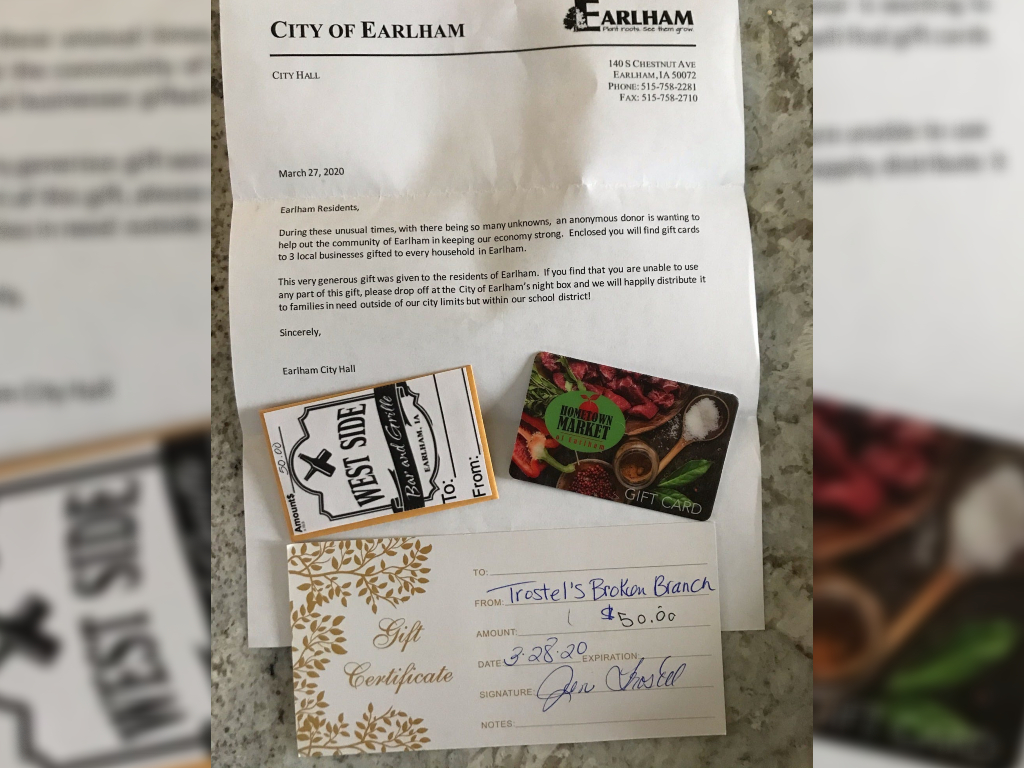A mystery man has given each household in a small Iowa town a gift card amounting to US$150 each during the coronavirus pandemic, totalling $82,000 (CA$115,000) in donations.

Earlham, Iowa has a population of approximately 1,450 people. The town’s mayor, Jeff Lillie, received a call from a friend informing him about the interested anonymous donor.
“When I told him there were 549 households in town, he said, ‘Done,'” Lillie told the Washington Post of the March 26 call. “I was ecstatic because it made sure everyone would get a card.”
Not long after, the homes began receiving a set of three gift cards for local stores, per USA Today — West Side Bar and Grille, Hometown Market and Trostel’s Broken Branch.
Any home that isn’t in need, the Post reports, is invited to return the cards to city hall, where they will be redistributed to families outside the city limits.
At first, Lilly said, the anonymous donor offered to buy 100 gift cards to the market and restaurant for $50 each, the local grocery store told USA Today. But Lillie wanted to include a restaurant that had just opened prior to the pandemic.
Over the course of the day, the man increased the number to 500 cards.
“That’s almost one per household,” Lillie recalled telling the man, who promptly increased the number of gift cards to 549.
Lillie managed to keep the gifts a secret for a week before they were distributed on Tuesday, and arrived at homes on Thursday, the Des Moines Register reports.
Leslie Mineart was one of the lucky people to come home to find the cards in her mailbox. She’s a public health educator and a single mother to two teens.
“It was such a nice surprise to find those cards in my mailbox that I knew I should pass that joy down to somebody else,” she told the publication, adding that she donated her grocery store card to another person.
“You couldn’t even believe what was happening,” Jennifer Trostel, whose husband owns Trostel’s Broken Branch, told the local publication. “You were so grateful you started to cry.”

“You couldn’t believe that people would actually want to help you in such a huge way that you can’t even fathom that kind of help.”
Mayor Lillie doesn’t know who the donor is, but says he’s done something historically huge for the small town.
“Financially, it’s one of the biggest things that’s ever happened to this small town,” he said.
—
Questions about COVID-19? Here are some things you need to know:
Health officials caution against all international travel. Returning travellers are legally obligated to self-isolate for 14 days, beginning March 26, in case they develop symptoms and to prevent spreading the virus to others. Some provinces and territories have also implemented additional recommendations or enforcement measures to ensure those returning to the area self-isolate.
Symptoms can include fever, cough and difficulty breathing — very similar to a cold or flu. Some people can develop a more severe illness. People most at risk of this include older adults and people with severe chronic medical conditions like heart, lung or kidney disease. If you develop symptoms, contact public health authorities.
To prevent the virus from spreading, experts recommend frequent handwashing and coughing into your sleeve. They also recommend minimizing contact with others, staying home as much as possible and maintaining a distance of two metres from other people if you go out.
For full COVID-19 coverage from Global News, click here.
—





Comments